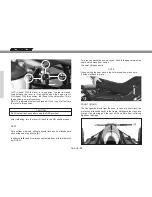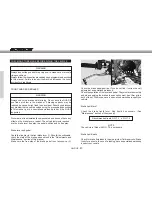
WILD HP -
98
-
balance. While you are crossing the slope, keep your body inclined
towards the top of the climb.
It might be necessary to correct direction by turning the steering
slightly uphill. When crossing slopes, do not perform tight turns up
or downhill.
If the quad starts to lose balance, turn gradually downhill if there is
not an obstacle in your way. When you have regained balance, turn
the steering back to the correct direction you are heading for.
GOING ACROSS SHALLOW WATER
With the QUAD you can, at slow speed, cross shallow water with
a maximum depth of 35 cm. Before entering the water, choose
carefully where you are going to cross.
Choose a place with no steep descends and avoid rocks and other
obstacles that may make you slip or lose stability with the QUAD.
Drive carefully and slowly.
WARNING
Do not cross fast waters or waters deeper than specified in this
manual. Remember that the brakes will get wet and lose efficiency
to stop the machine. Check the brakes after leaving the water. Use
them several times to make them dry if necessary.
NOTE
After crossing water with the quad, eliminate the water that
might have entered the system by unplugging the retention
tube at the bottom of the filter box. Wash it in fresh water if you
have driven across salt water or mud.
RIDING IN ROUGH TERRAIN
Riding in rough terrain must be performed very carefully. Be always
alert to any obstacle that may damage the QUAD, make you lose
balance or cause an accident. Keep your feet firmly placed on the
footrests at all times. Avoid jumping over obstacles with the vehicle.
It might cause you to lose control and damage the machine.
SLIDING
When riding over slippery or loose surface, do it carefully as the
QUAD could slide. An unexpected slide not corrected in time could
result in a serious accident.
To reduce the tendency of the front wheels to slide on slippery
surfaces, sometimes it is useful to put your weight on them.
If the rear wheels start to slide sideways, you can usually regain
control by turning the handlebars towards the slide, if there is enough
room to do that. You are not recommended to accelerate or brake
until you have corrected the slide.
With practice, after some time you can dominate the controlled-
sliding technique. Before attempting to do so you must choose the
adequate ground carefully, as both stability and control are reduced
when doing them.
Take into account that you must avoid sliding in extremely slippery
surfaces, like for example ice, as you could lose control completely.
NOTE
Learn to control your slides safely by practising at slow speed
on flat ground with no inclination.
















































